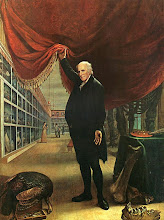- How did the superhero concept change in the transition from the pulps to the comics?
- How are these early renditions of Superman different from what you are used to?
- What elements of these stories can be related to the late 1930s time period in which they were published?
Wednesday, April 23, 2008
History 4004 students: Discuss Golden Age comics here
Remember there will be no class today, April 24. Work on your papers, but also participate in an alternative discussion right here. Leave comments under your real name, or else inform me by email of what screen name you used. You should all have received an email with links to some early issues of Action Comics featuring some of the first appearances of Superman. Read those and the "Golden Age" chapters of Comic Book Nation, and answer one or more of the following, or make some other relevant observation:
Subscribe to:
Post Comments (Atom)





8 comments:
This Post Was Written By Lauren Salant:
The early renditions of Superman are very different than the ones I grew up watching and reading. Most recently the Superman that comes to mind is the character that was created for the show Smallville. This character is very different than what we have read about in the early 1930-1940's comics. In the older comics the character seemed to only see black and white, good and evil. Superman was alien and possessed the powers of a stronger than life super man. He worked for himself to fight off evil even if it meant working against the cops. Many of his actions portrayed American ideas. He fought for the poor, the lesser of the country. In the common day Smallville Clark Kent is very americanized and very humanized. He no longer only sees black and white, he now has emotion and thinks more rationally about good and evil.His decisions he makes reminds the viewers that even though he is alien and super he is still human at heart.
It had not occurred to me that someone might only know Superman from "Smallville." Ack! Of course, even the 1930s Superman was humanized compared to most of his pulp predecessors. Do you guys see how?
To answer the 3rd question, I think the whole concept of Superman was to inspire and uplift the American morale at the end of the 30's. We all know about the economic situation in the country at the time, high unemployment, and corporate greed. The whole "is capitalism as good as it's advertised?" thought was running rampant at the time. Superman stood for all that was good in America. I guess the whole thing for me, and it's probably an obvious theme and easy one to pick out is Superman is a common man (Clark Kent) that can achieve extraordinary things. Yeah the 1930's were a trying time, but Americans could overcome those times by living Supermans motto of "truth, justice, and the American way."
The only major difference I see between the Superman portrayed during the Golden Age and the Superman of today is that the relationship between Louis Lane and Clark Kent lacks the romantic element that it would take on as the character evolved.
As for how these stories relate to the time when they are published, I think that is fairly obvious. These stories were actually quite political for their time. The economy was in shambles and that was evident in the comic books of this era. Superman and other characters were often shown fighting corrupt politicians, abusive employers, etc. Then when WWII began superheroes started fighting Germans and Asians. In one cartoon from the 1940s titled "11th Hour" Clark Kent is Yokohama on assignment and every night sabotages the Japanese mission.
A final note about the heroes from this era is that there was actually some ambiguity about the morality of what they were doing. In the early issues of Superman often went after the legal and political establishments for not doing their job and Batman was treated by the police force as a vigilante in many early issues, which was a far cry from how the characters were portrayed in the '50s and '60s.
The transition from pulps to comics marked a shift in the superhero. The Shadows and Doc Savages and Spiders of the pulps were rich men of society, the elite. Doc Savage, for instance, was Clark Savage Jr., the son of Clark Savage Sr. who was the founder of an Inca gold mine. This is quite the comparison to Clark Kent's daytime newspaper profession. The comics marked the evolution of the superhero. No longer was the murderous escapade of the pulp hero acceptable. Instead, the superheroes of the comics have origin stories and motivations to go out and save society. They're not trying to destroy Manhattan. Rather, the superhero emerged as a less violent helper of the people, embracing greater ordinariness than the pulps in their everyday life.
The earlier versions were definitely a strench from what I'm used to seeing. The more film versions that followed the original were more humanized with a backstory or a more toned down decription of his origins. He is more plagued by trials and tribulation compared to the lack of struggle he previuosly showed during confrontations. The earlier versions of Superman also generally portrayed their enemy as an idiot by the end of the story.
Who knows where to download XRumer 5.0 Palladium?
Help, please. All recommend this program to effectively advertise on the Internet, this is the best program!
25mg keflex Discount cordarone Order zyprexa 50mg buspar Free pills symmetrel Online cleocin
Post a Comment